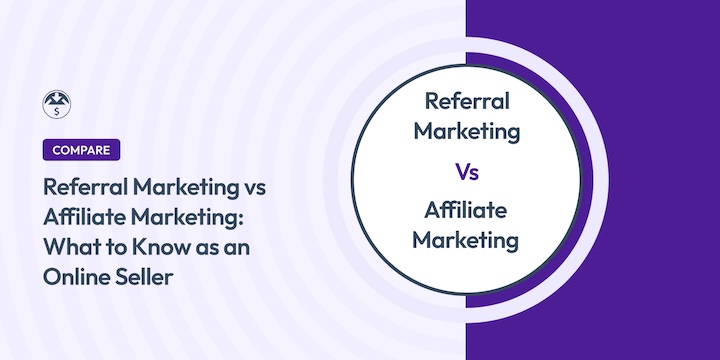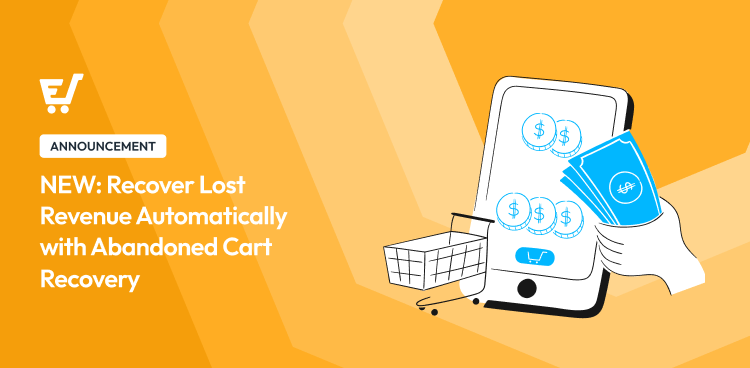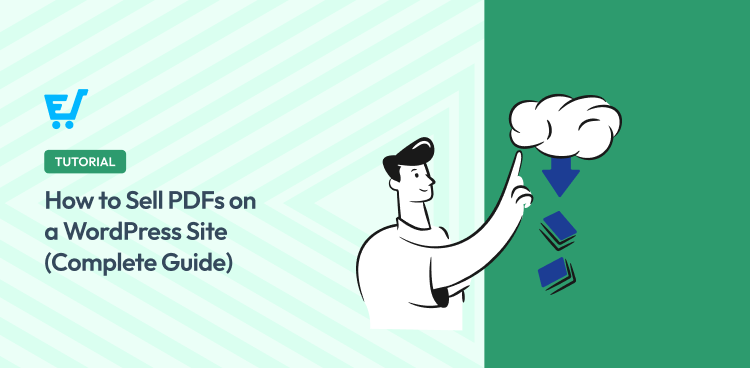A stressful part of running an e-commerce site is figuring out the best ways to get more customers. Two strategies that consistently come up are referral marketing and affiliate marketing.
While they might sound similar, they’re quite different in how they work and the results they deliver. I’ve learned from experience that understanding these key differences and similarities can significantly influence your success.
In this guide, I’ll break down everything you need to know about referral marketing vs affiliate marketing for WordPress eCommerce sites. You’ll discover which approach works best for different situations and how to choose the right strategy for your business.
- What Is Referral Marketing?
- What Is Affiliate Marketing?
- Referral Marketing vs Affiliate: Key Differences
- Combining Affiliate & Referral Marketing
- Referral Marketing vs Affiliate Marketing Uses
- Best Referral Marketing WordPress Plugin
- FAQs on Affiliate vs Referral Marketing
- Try Affiliate & Referral Marketing in WordPress
What Is Referral Marketing?
Let me start with a simple definition: Referral marketing is like having your best customers become your personal sales team. It’s a strategy that leverages your existing satisfied customers to bring in new customers through digitally-enabled word-of-mouth recommendations.
At its core, referral marketing is what we often call “refer-a-friend marketing.” It’s based on a simple premise: people trust recommendations from friends and family more than any advertisement or marketing message you could create. When your customer loves your product so much that they’re willing to stake their reputation on recommending it to their friends, that’s incredibly powerful.
How Referral Marketing Works
The mechanics are beautifully simple, and that’s part of what. Here’s how it typically works:
- Customer A discovers your WordPress store and falls in love with your products. They make a purchase and have an amazing experience.
- Then, your referral system kicks in – Customer A gets a unique referral link or code that they can share with their friends.
- When Friend B clicks that link and makes a purchase, both Customer A and Friend B receive some kind of reward. It could be a discount, store credit, a free product, or even cash.
Think of companies like Dropbox or Airbnb – they’ve built their entire growth engines around this concept. Dropbox famously grew from 100,000 to 4 million users in just 15 months largely through their referral program.
When someone referred a friend, both the referrer and the new user got extra storage space. Brilliant, right?
For WordPress eCommerce sites, this translates beautifully. Imagine you’re selling digital products through Easy Digital Downloads, and a customer loves your online course.
They share their referral link on social media, and three of their friends purchase the course. Everyone wins – the original customer gets rewards, their friends get a great product, and you get three new customers without spending a dime on ads.
There’s some fascinating consumer psychology at work here. When someone refers your product, they’re essentially putting their personal reputation on the line. They’re saying, “I trust this brand so much that I’m willing to recommend it to people I care about.”
From the recipient’s perspective, getting a recommendation from a friend carries enormous weight. It comes with built-in social proof and trust that no amount of advertising can replicate.

Key Characteristics of Referral Marketing
What makes referral marketing unique? Several key characteristics set it apart:
- Trust-based: Built on existing relationships and personal recommendations
- Advocacy-driven: Customers become genuine advocates for your brand
- High-quality leads: Referred customers often have higher lifetime value
- Cost-effective: Lower customer acquisition costs compared to traditional advertising
- Relationship-focused: Strengthens bonds with existing customers
Pros and Cons of Referral Marketing
Pros 👍
- High Trust Factor: When your friend recommends something, you’re much more likely to try it. This trust translates into higher conversion rates and better customer relationships from day one.
- Lower Acquisition Costs: Instead of spending hundreds of dollars on ads to acquire a single customer, you’re rewarding existing customers with discounts or credits. The math usually works out much better.
- Increased Customer Loyalty: When customers participate in your referral program, they become more invested in your brand. They’re not just customers anymore – they’re partners in your growth.
- Better Lead Quality: Referred customers often stick around longer and spend more money. They come pre-qualified through the recommendation of someone they trust.
- Increased Customer Lifetime Value: Because referred customers tend to be more loyal and engaged, they often end up being more valuable over time.
Cons 👎🏼
- Limited Reach: You’re only reaching the networks of your existing customers.
- Slower Growth: Unlike paid advertising, referral marketing typically grows more organically and steadily.
- Dependent on Customer Satisfaction: If customers aren’t happy, they won’t refer others.
What Is Affiliate Marketing?
Now let’s talk about affiliate marketing, which is a different beast altogether. Affiliate marketing is a performance-based marketing strategy where you partner with external promoters (called affiliates) who earn commissions for driving traffic or sales to your WordPress site.
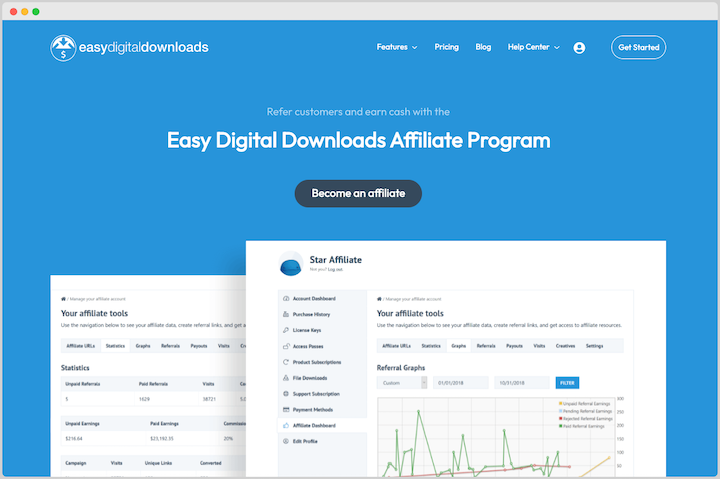
Think of affiliate marketing as building a network of independent sales representatives who promote your products to their audiences.
The key difference from referral marketing? These affiliates don’t necessarily need to be your customers – they’re motivated primarily by the potential to earn commissions.
How Affiliate Marketing Works
The affiliate marketing process is straightforward but powerful. Here’s how it works:
- An affiliate (this could be a blogger, influencer, coupon site, or content creator) joins your affiliate program. They receive unique tracking links for your products.
- The affiliate then promotes your products through their content – maybe they write a blog post reviewing your WordPress plugin, create a YouTube video demonstrating your digital course, or share your products in their newsletter.
- When someone clicks the affiliate’s unique link and makes a purchase on your site, the affiliate earns a commission. The beauty is in the tracking. Everything is monitored automatically, so you know exactly which affiliate generated which sale.
Amazon Associates is probably the most famous example of affiliate marketing. Millions of content creators earn commissions by recommending Amazon products.
But it’s not just giant companies – I’ve seen small WordPress store owners build incredibly successful affiliate programs that drive significant revenue.
Key Characteristics of Affiliate Marketing
Affiliate marketing has some distinct characteristics that make it different from referral marketing:
- Broader reach: Affiliates can expose your brand to entirely new audiences
- Commission-based incentives: Affiliates are motivated by earning potential
- Performance-based costs: You only pay when results are delivered
- Scalable: You can work with dozens or hundreds of affiliates simultaneously
- Professional partnerships: Many affiliates treat this as a business
Pros and Cons of Affiliate Marketing
Pros 👍
- Wide Reach: Your affiliates can introduce your brand to audiences you’d never reach otherwise.
- Performance-Based Costs: You only pay when affiliates deliver results. No results, no payment.
- Scalable Growth: Once you have systems in place, you can onboard dozens of affiliates and scale your reach exponentially.
- Targeted Marketing: You can partner with affiliates in your specific niche who already have the exact audience you want to reach.
- Brand Awareness: Even when affiliates don’t generate immediate sales, they’re creating awareness and exposure for your brand.
Cons 👎🏼
- Brand Misrepresentation Risk: Since you don’t control how affiliates promote your products, there’s risk they might misrepresent your brand or make false claims.
- Commission Costs: Depending on your margins, commission payments can eat into your profit.
- Management Requirements: A successful affiliate program requires ongoing management, communication, and support.
- Fraud Risk: Unfortunately, some affiliates engage in fraudulent practices like fake traffic or click fraud.
Referral Marketing vs Affiliate: Key Differences
Now that we’ve covered both strategies individually, let’s put them head-to-head and see how they compare. This comparison will help you understand which approach might work better for your WordPress eCommerce site.
| Aspect | Referral Marketing | Affiliate Marketing |
|---|---|---|
| Target Audience/Participants | Loyal, existing customers who love your products | External marketers, bloggers, influencers, and content creators (may not be customers) |
| Primary Goals/Motivation | Desire to help friends + receive rewards; brand advocacy and loyalty | Financial gain through commissions; business opportunity |
| Cost Structure | Discounts, store credits, small gifts, or non-cash incentives | Percentage commission on sales or fixed fees per action |
| Reach & Scale | Limited to customer networks; one-to-one or one-to-few; high trust | Potentially very broad, depending on affiliate audience size |
| Promotion Style | Personal recommendations, word-of-mouth, social sharing | Content marketing, reviews, ads, email campaigns, SEO |
Combining Affiliate & Referral Marketing
While these strategies have distinct differences, they also share some important similarities that make them both valuable for WordPress eCommerce sites.
- Both strategies are forms of word-of-mouth marketing at their core. Whether it’s a customer recommending to a friend or an affiliate recommending to their audience, you’re leveraging the power of personal recommendations over traditional advertising.
- They’re both performance-based, meaning you only pay when results are delivered. With referral marketing, you only give rewards when successful referrals happen. With affiliate marketing, you only pay commissions when sales are generated.
- Both strategies aim to acquire new customers through trusted recommendations, and both rely heavily on proper tracking systems to work effectively. For WordPress sites, this means you need reliable plugins and systems to track referrals and affiliate activities.
Here’s something important to understand: these strategies aren’t mutually exclusive. In fact, they can work beautifully together. Many successful WordPress eCommerce sites use both strategies as part of their overall growth strategy.
You might use referral marketing to deepen relationships with existing customers and generate high-quality leads from their networks, while simultaneously running an affiliate program to expand your reach into new markets and audiences.
For example, you could have a referral program that rewards customers with store credit for successful referrals, and an affiliate program that pays content creators 30% commissions for promoting your products. The referral program builds customer loyalty and generates trusted leads, while the affiliate program drives volume and brand awareness.
Referral Marketing vs Affiliate Marketing Uses
Choosing these strategies depends on your specific situation, goals, and resources. Let me walk you through the key scenarios where each strategy shines.
Use Referral Marketing When…
😊 You Have a Satisfied, Engaged Customer Base: Customers who are genuinely happy with your products and actively engage with your brand are prime candidates for referral marketing.
📣 Your Products Naturally Inspire Word-of-Mouth: If you’re selling something that solves a real problem, provides exceptional value, or creates a “wow” moment, referral marketing can be incredibly effective.
💬 You’re Trying to Deepen Customer Relationships: Referral programs create a deeper connection with your customers.
💰You Need Cost-Effective Growth: If you have limited marketing budgets, referral marketing can provide excellent ROI. The rewards are typically much less expensive than paid advertising costs.
🎁 You Prioritize Quality Over Quantity: Referred customers often have higher lifetime values and better retention rates. If you’d rather have 10 high-quality customers than 100 mediocre ones, referral marketing aligns with that goal.
Use Affiliate Marketing When…
💸 Primary Goal Is Rapid Scaling: If you need to grow quickly and fast, affiliate marketing can provide that scale.
🔑 Have Resources to Manage Relationships: Successful affiliate programs require ongoing management. You need to recruit affiliates, provide them with marketing materials, answer questions, and maintain relationships.
📈 Products Have Good Margins: Affiliate commissions can be substantial – often 20-50% of the sale price. Your products need sufficient margins to support these payouts while still maintaining profitability.
🚀 Launching New Products: When you’re introducing new products and need to generate awareness quickly, affiliates can help you reach established audiences in your niche.
🛍 Work With Influencers and Content Creators: If there are bloggers, YouTubers, or social media influencers in your niche who could effectively promote your products, affiliate marketing provides the framework for these partnerships.
Best Referral Marketing WordPress Plugin
If you’ve decided that referral marketing is right for your WordPress site (or you want to implement it alongside affiliate marketing), you’re going to need the right tools. Let me tell you about what I consider the best solution for WordPress users.
While the name might suggest it’s only for affiliate marketing, AffiliateWP (and its companion RewardsWP) is actually perfect for referral marketing too.
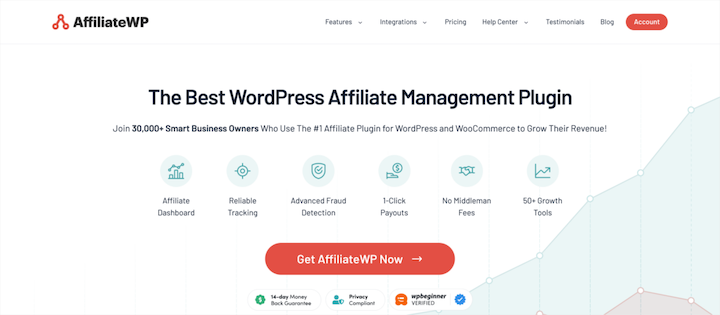
If you’re running an online store with WooCommerce or selling digital products through Easy Digital Downloads, AffiliateWP integrates seamlessly. It’s built specifically with WordPress eCommerce in mind, which means you don’t have to worry about compatibility issues or complex workarounds.
AffiliateWP recently launched its newest plugin: RewardsWP. This refer-a-friend WordPress plugin is built specifically for referral marketing and creating a referral program.
The integration is so smooth that customer referrals are tracked automatically. When someone makes a purchase through a referral link, the system captures all the necessary data without any manual intervention from you.
💡 Learn how to start an affiliate program in WordPress.
Setting up a referral program takes minutes, not hours. The plugin walks you through the process step-by-step, and you can have your first referral campaign running the same day you install it.
AffiliateWP uses reliable tracking methods that work across different browsers and devices. It handles cookie-based tracking, handles complex scenarios like customers clearing cookies, and provides detailed reporting so you always know what’s happening with your referral program.
These referral and affiliate marketing solutions handle every aspect of affiliate and referral marketing that you need.
- Automatic link generation for customers
- Real-time tracking and reporting
- Automated reward calculation and distribution
- Customer dashboards where they can track their referrals
- Administrative tools for managing the entire program
- Integration with email marketing tools for automated communications
FAQs on Affiliate vs Referral Marketing
Let’s wrap up with some frequently asked questions about affiliate marketing vs referral marketing and using these strategies for your WordPress website.
What’s the main difference between affiliate vs referral marketing?
The main difference lies in who’s doing the promoting and why. Referral marketing uses your existing satisfied customers who recommend your products to friends and family out of genuine advocacy (with rewards as a bonus). Affiliate marketing uses external partners like bloggers and influencers who promote your products primarily to earn commissions. Referral marketing is trust-based and relationship-driven, while affiliate marketing is performance-based and business-focused.
Can I use both referral and affiliate marketing together?
Absolutely! Using both strategies together can be incredibly powerful.
They serve different purposes and reach different audiences. You can use referral marketing to deepen relationships with existing customers and tap into their trusted networks, while using affiliate marketing to reach new audiences and scale more rapidly.
What WordPress plugins can I use for referral marketing?
For WordPress sites, I highly recommend AffiliateWP, which works excellently for both referral and affiliate marketing. It integrates seamlessly with WooCommerce and Easy Digital Downloads, offers flexible reward options, and provides reliable tracking.
Is affiliate vs referral marketing different for e-commerce stores?
Yes, the application and rewards can differ significantly for e-commerce stores. Referral marketing in eCommerce is directly to store products and services. You might offer “$10 off next purchase” or “free shipping for you and your friend.” The goal is to encourage repeat and direct product engagement.
Affiliate marketing for e-commerce typically involves unique coupon codes or direct links to product pages, with commissions usually being a percentage of the sale value. The tracking and reward systems need to integrate with your eCommerce platform to work effectively.
Try Affiliate & Referral Marketing in WordPress
We’ve covered a lot of ground in this deep dive into referral marketing vs affiliate marketing for WordPress eCommerce sites.
Affiliate marketing is your pathway to rapid scaling and reaching entirely new audiences. Referral marketing is your go-to strategy when you have satisfied customers and want to leverage their trust and relationships to generate high-quality leads.
Here’s the beautiful thing: you don’t have to choose just one. For WordPress site owners, especially those using WooCommerce or Easy Digital Downloads, implementing these strategies has never been easier thanks to tools like AffiliateWP. You can have a referral program up and running in minutes, and the tracking and management features handle all the complex backend work automatically.
If you sell digital products and want an eCommerce plugin with seamless integration with AffiliateWP, get your EDD pass today.
Looking for more ways to boost sales and expand your reach? Check out how to build an email list using free downloads!
📣 P.S. Be sure to subscribe to our newsletter and follow us on Facebook, Twitter/X, or LinkedIn for more WordPress resources!
